"Being with the people, addressing their needs, and aiding them through the hardships of war," Bishop Vasyl Tuchapets on the Сhurch's mission in frontline Slobozhanshchyna
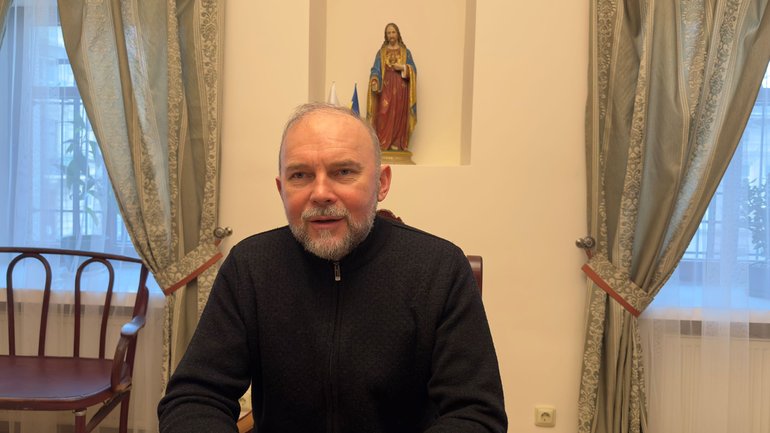
In a conversation with RISU, he talks about the life of the UGCC in the Kharkiv region over these two years, the changes that have taken place in the city, and the challenges the Church currently faces.
"I arrived in Kharkiv on February 12, 2022, right after the Synod and was engaged in pastoral affairs. During those weeks, much information suggested that a full-scale war could break out soon. Yet, I couldn't believe it would come to pass. February 24 came as a surprise. I woke up at 5 a.m. to shelling. I looked up and saw the horizon ablaze. At that moment, I realized that the war had come. At 6 am, we received a phone call from the security guard at the church. He said he was going home, and someone needed to be at the church."
— Did anyone remain there? Were there any priests?
— The priests stayed." Father Sergiy Koval, who served in a Vilcha parish near Volchansk (5 km from the Russian border), called in the morning and asked: "What should I do?” He and his two children woke up to missiles flying at Kharkiv. Luckily, my wife and her other three children were in the Lviv region with their parents. The father and his children came to Kharkiv, and they headed westwards. As it was, all our priests remained.
One of our priests, Fr. Oleksandr, stayed in Sumy and conducted the liturgy for Greek and Roman Catholics as the Roman Catholic priest could not return from Kharkiv. Some priests came back with their wives and children.
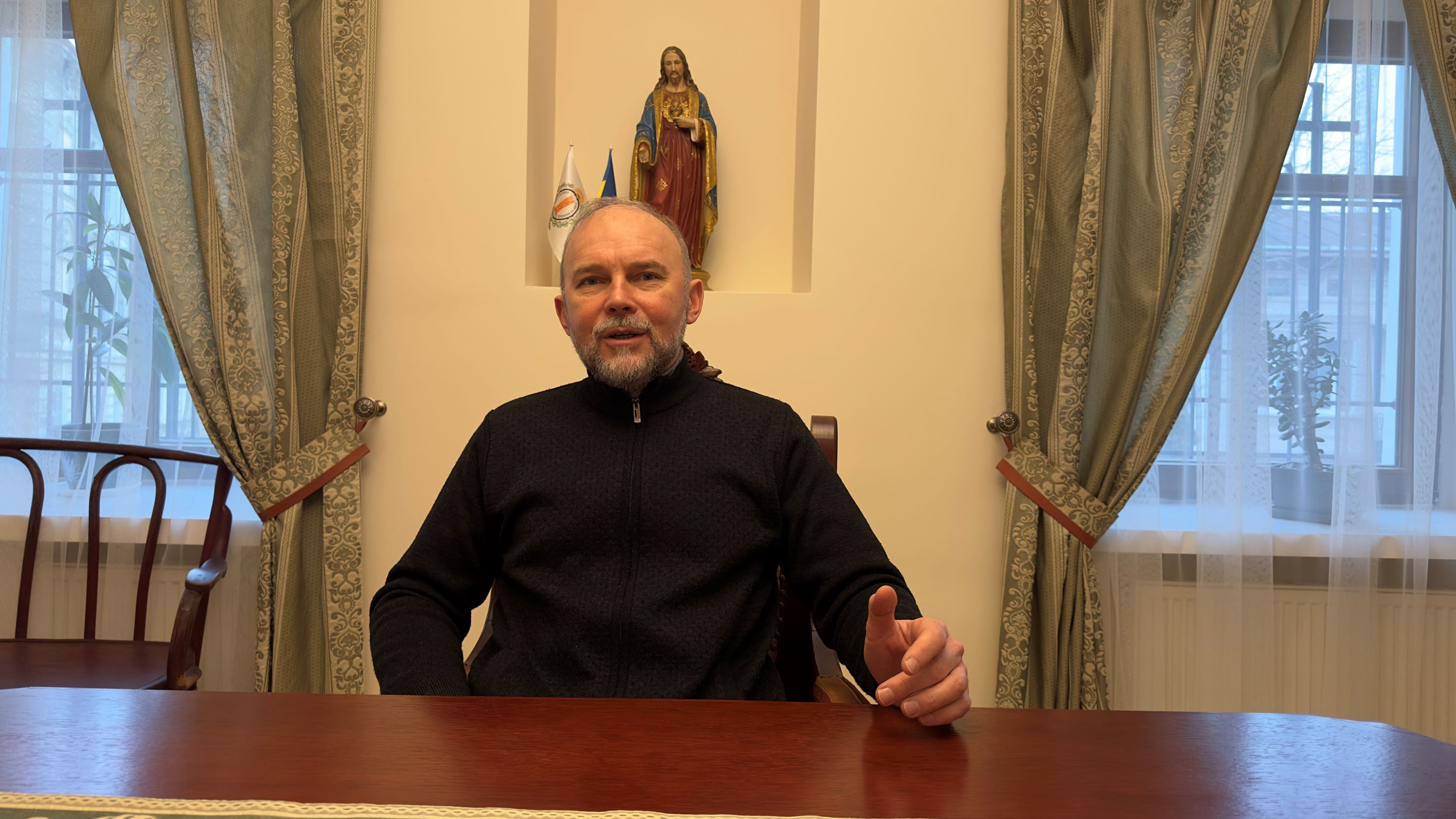
— At a certain point, it was unclear whether Russian troops would enter Kharkiv. What did your communication with Kyiv look like? What kinds of tasks were set before you?
— His Beatitude Sviatoslav said: "If there is a threat of the city being surrounded, leave. That's what I told the priests. Yet, we had to stay in the parishes and serve the people as long as the city was not occupied. Although Russian troops were stationed near Kharkiv on the first day of the full-scale war, they were stopped. Several vehicles of their special forces were eliminated within the city, and constant shelling of Kharkiv began. Our troops set up roadblocks everywhere. The city held out, and the Russians failed to take it. Then the Ukrainian Armed Forces began to liberate the Kharkiv region, and by the autumn of 2022, almost the entire territory was freed.
— How did the Church operate? What was your mission at that time?
— The situation was uncertain, and no one knew what to expect. Television and the internet did not work in the early days, and mobile network was barely functional. Yet, we decided to stay and serve the people as long as there was no threat of being besieged. We never stopped holding services. We also prayed for our Armed Forces, asking the Lord to protect them and our country.
There was a general sense of panic in the city. Public transport ceased to operate. There were huge queues at the petrol stations, and those without a car went to the train station with their suitcases to leave the city. Shops and supermarkets stood empty; everything was sold out, and there was no way to deliver food. One couldn’t even buy bread.
Even then, people started coming to the church asking if there was any food. About two weeks later, we received humanitarian aid. So many people arrived at the time! It was chaos. None of us had had such an experience before. First aid was difficult to allocate appropriately. We took photos, made posts about the needs on our social networking site, and thanked the donors. Then, people could see what was missing and started to offer help. Evacuation trains went from Kharkiv to Lviv. They returned empty, so the volunteers loaded them with humanitarian aid. It was quite a challenge, but we had to address the people’s needs. Various charities joined us in our endeavour.
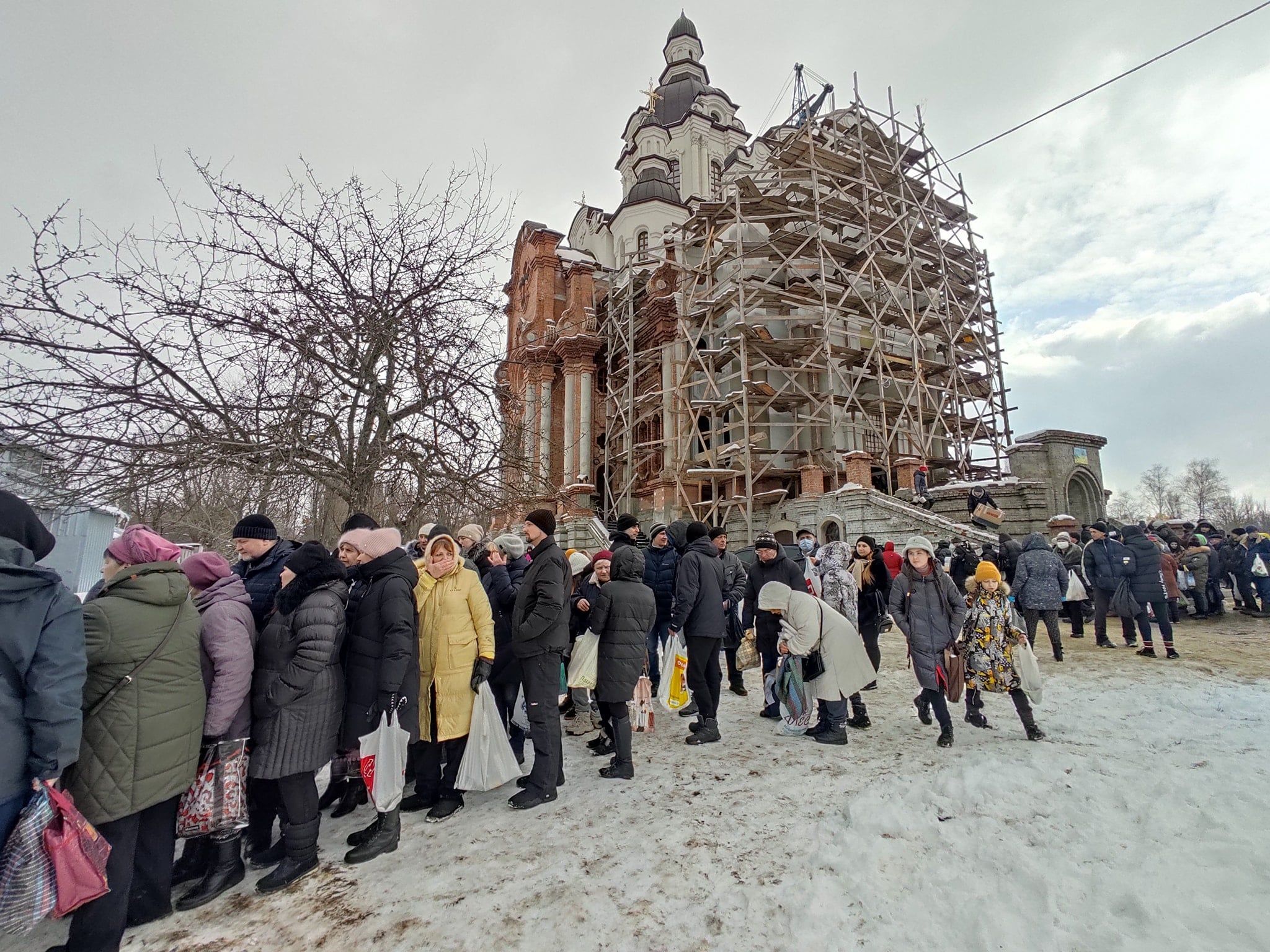
In fact, every day would be spent praying and distributing humanitarian aid. Over time, we started sorting through everything that came in. We still have those first locations with medicines, baby food, hygiene kit items, etc.
Aid from abroad is no longer coming, as it would at the beginning of the full-scale invasion. We have our own contacts now and look for help ourselves.
— What about the parishioners? Did they leave?
— Most parishioners left, especially those from the west of Ukraine. Some locals refused to leave, so we started working together. We needed more people to unload arriving trucks. We created a database of contacts of men living nearby and invited them to join us when needed. We also required medical professionals who could sort through the medicines on hand. The doctors were coming too. The medical department is now run by Inna, a professor who teaches at the National Pharmaceutical University in Kharkiv, Olena, and Nataliia, a paediatrician.
— Are these your parishioners?
— No, these people hadn’t visited us before. They lived in our district and would come to get humanitarian aid, and later, they began to come to our church. While many of Kharkiv's inhabitants left, those who had fled from the occupied territories would come to the city. Those people had nothing. They came for essentials first, then stayed and started attending our church."
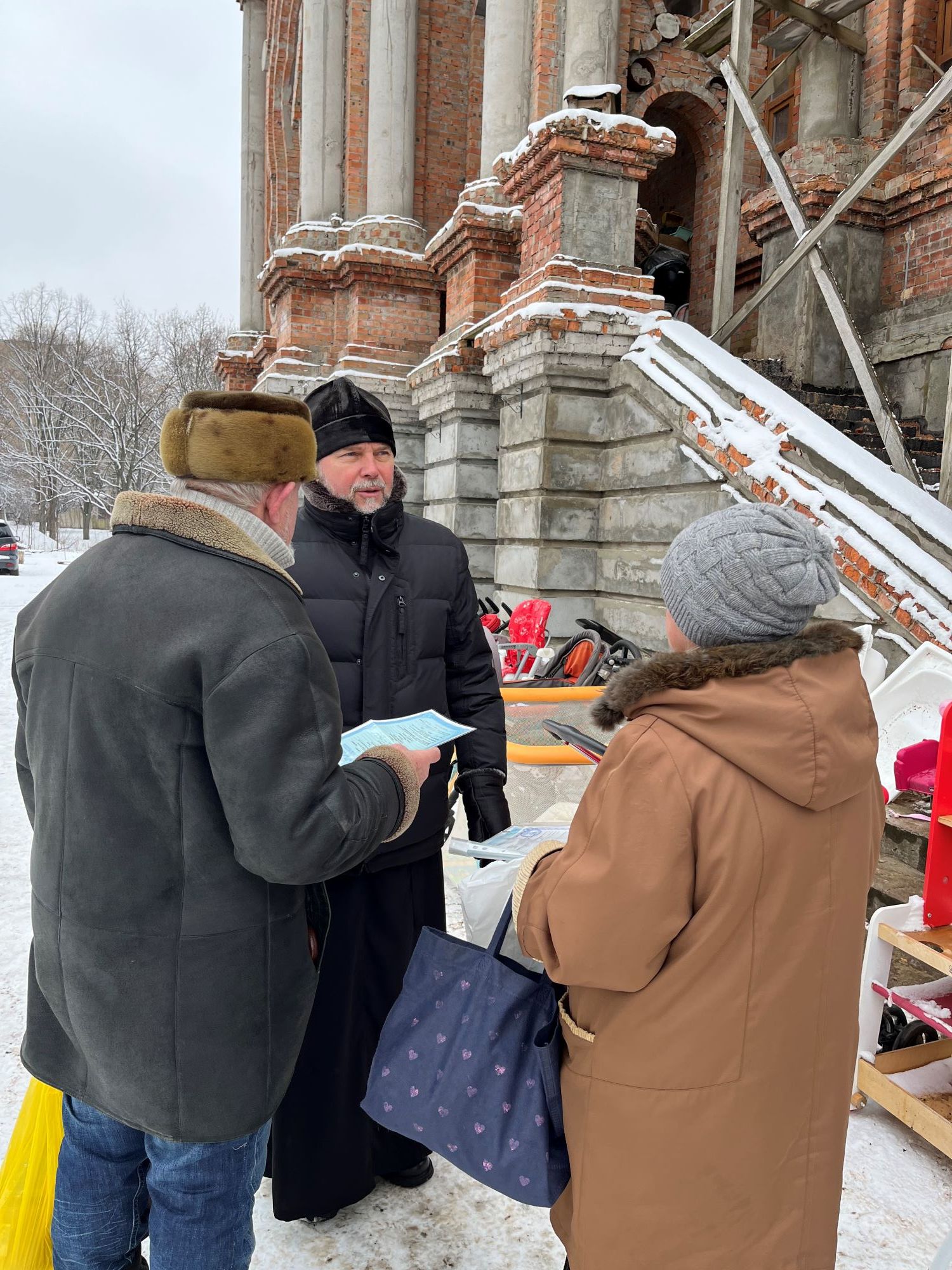
— Has your parish changed significantly over the past two years?
— Yes, it has changed a lot.
— What was the non-Greek-Catholics’ attitude towards the parish and your ministry?
— The church provided aid, giving them a solid incentive to come. Two thousand people come to us seeking help every week. That doesn't mean they all actually attend services at the church. However, I noticed that people's attitudes towards the church changed significantly.
There were many agnostics and atheists in Kharkiv, those who had that Soviet-like negative view of the church. However, they changed their attitude when the church started helping people during the war. Now they treat it with respect and reverence.
— Did you hold services underground, e.g. in the subway?
— We didn't do so on purpose. The subway became our bomb shelter. We also helped those staying there. There is the "Heroes of Labor " station, the last one in the direction of the village of Tsyrkuny ― to the Northern Saltivka, which was most heavily shelled (we are also in the Saltivka district, but not the Northern one). So, the people in this area stayed at the metro stations. Approximately 1.5 thousand people lived at this station in the first months. We brought them food, mattresses, and blankets. There was no free space as every spot was occupied by people, including those with disabilities, older people, parents with children and infants. The conditions were poor; it was hard to breathe. Sadly, such was the case with all stations.
Our church is still under construction, though. We hold services in the underground church, which also serves as a bomb shelter. People would hide and spend the night there during intense shelling. The "upper" church has become a warehouse for humanitarian aid.
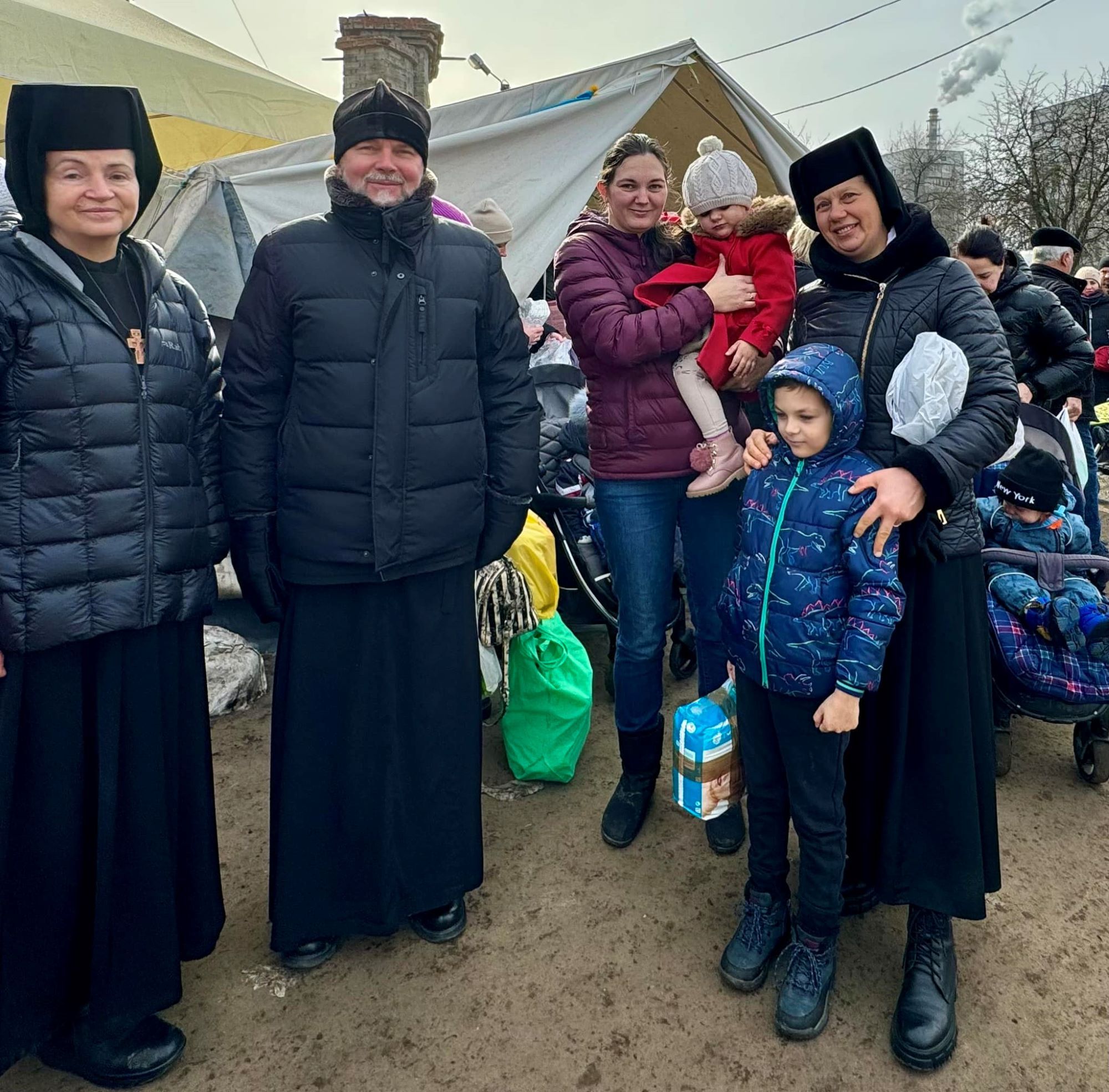
— What does Kharkiv look like now? How has it changed over the past two years?
— Kharkiv has changed a lot. Before the full-scale war, it was a city with a Soviet mentality, one close to Russia. Many locals had relatives living in Belgorod and thus maintained close contact. Few would speak up against Russia. And, of course, almost everyone used the Russian language.
When the full-scale war broke out, people began to make up their minds and take sides. Although most hesitated at the time, now they have a clear position: we are Ukraine, Russia is the aggressor, and the Russians are attacking and killing us. Most people identify as Ukrainian, even if they speak Russian. Some of them eventually switch to Ukrainian.
Near the church, we converse with each other and people in Ukrainian. We all hold services in Ukrainian. People know this and try to greet or thank us in Ukrainian. There was simply no habit of speaking Ukrainian in Kharkiv. Today, people's attitudes towards the Ukrainian language and culture are different.
— Tell us about the relationship between people and denominations. Recently, a week of prayer for the unity of Christians was held, and I saw you pray together with Roman Catholics, Greek Catholics, and Lutherans. What can you say about your current relationship with the Moscow Patriarchate? What is their position?
— We never had close relations with the UOC-MP, although we always invited them to pray for the unity of the Church. They never came, though. We even met before the full-scale war at state-level events, such as laying flowers on Independence Day. However, our relations with the Moscow Patriarchate have become warmer.
The OCU, though, would participate in divine services for the unity of Christians even before receiving the Tomos. They don't take part in these joint prayers anymore. There is also the Armenian Apostolic Church, which always participates in common prayer.
Nevertheless, we try to maintain fraternal relations with all denominations and invite them to participate in joint events. We maintain the best relations with Roman Catholics and the Armenian and Lutheran communities.
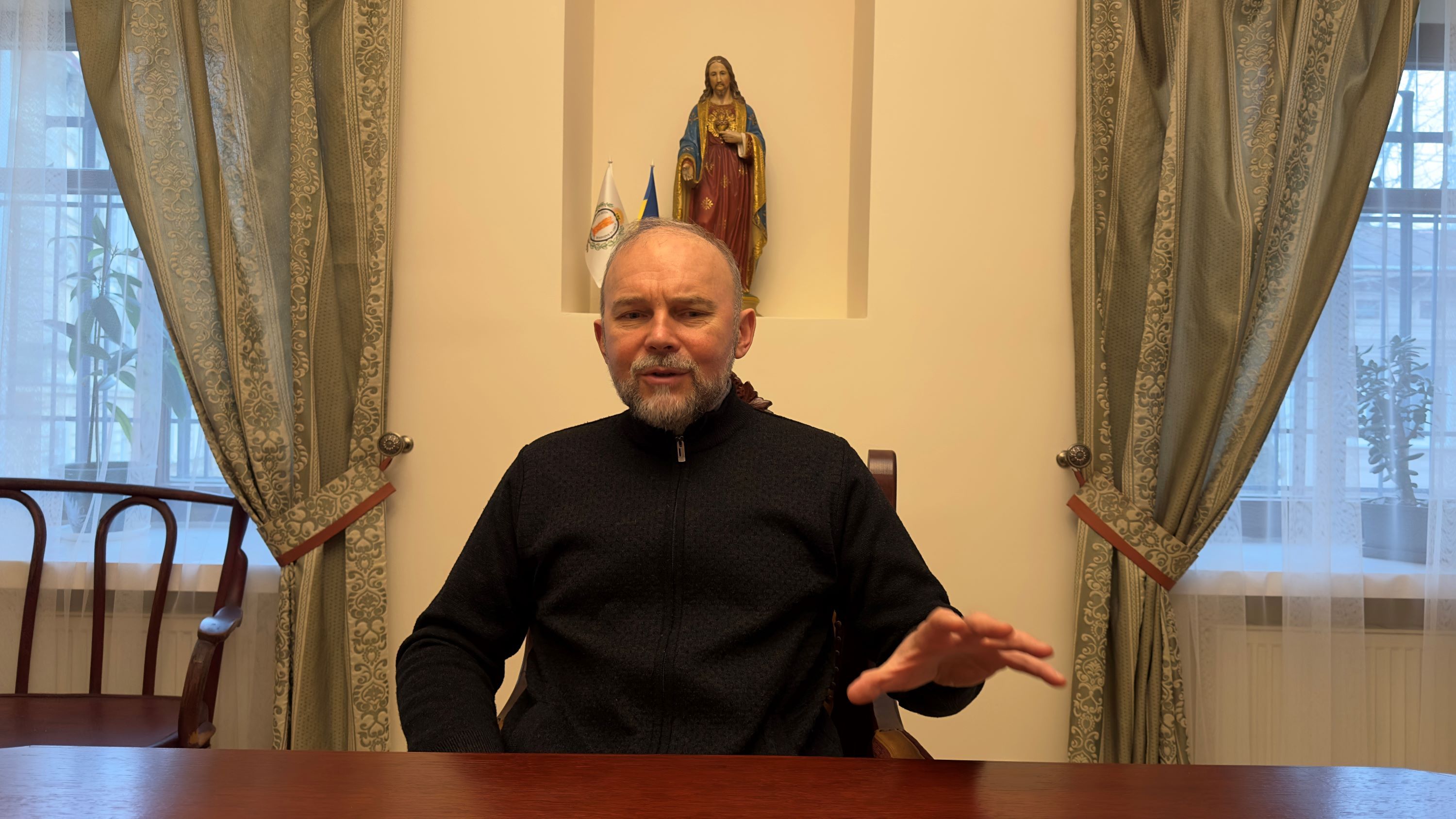
— There were many people with pro-Russian views in Kharkiv, people who used the Russian language and respected Russian culture. Are there any changes in the national and patriotic regard? I mean, are there changes in the city as a community?
— Kharkiv has always been a clean and well-groomed city. This aspect was meticulously taken care of. Even during the war, with all the shelling and destruction, municipal services would immediately clean up everything. Dangerous as it was, even the garbage was being taken away as often as possible.
The citizens’ needs were also always addressed. For instance, when the Russians hit the heating networks, municipal services worked to fix everything quickly so people would not be left without heat, electricity, and water.
The attitude towards everything Ukrainian has also changed. The remnant Soviet principles in education and state institutions are being eliminated. Streets are being renamed, and no one is arguing about keeping Soviet toponyms anymore, although there used to be heated discussions. As a Greek Catholic community, we also submit proposals regarding new street names. Relations with the city authorities have changed a lot, becoming more open and friendly.
— Do people return to the city?
— Some have returned, with most of them being elderly people. Those with young children usually do not return because schooling in Kharkiv is remote. Of course, some families with children came back, but these are few. When more intense shelling began, some families were forced to leave the city again.
People from the frontline zones ― from Volchansk and Kupyansk districts, where active military operations are underway ― are also moving to Kharkiv. It is simply impossible to live there. They come here to get a new home as quickly as possible. Some people lost their homes, so there is no place for them to return.
— Have the сhurch and your parishioners suffered such losses?
— Thank God we were spared. Naturally, we worry a lot, especially when distributing humanitarian aid ― there are many people to care for. Our parish house in Vilcha was damaged. There is a chapel in the Mother and Child Center where we hold services. After a shell exploded in a neighboring house, the chapel’s windows were shuttered, and the facade chipped. In Zolochiv, we also have a parish house where we hold services. A shell exploded in the yard, and the roof, windows, and doors will have to be replaced. The outdoor kitchen was destroyed, too.
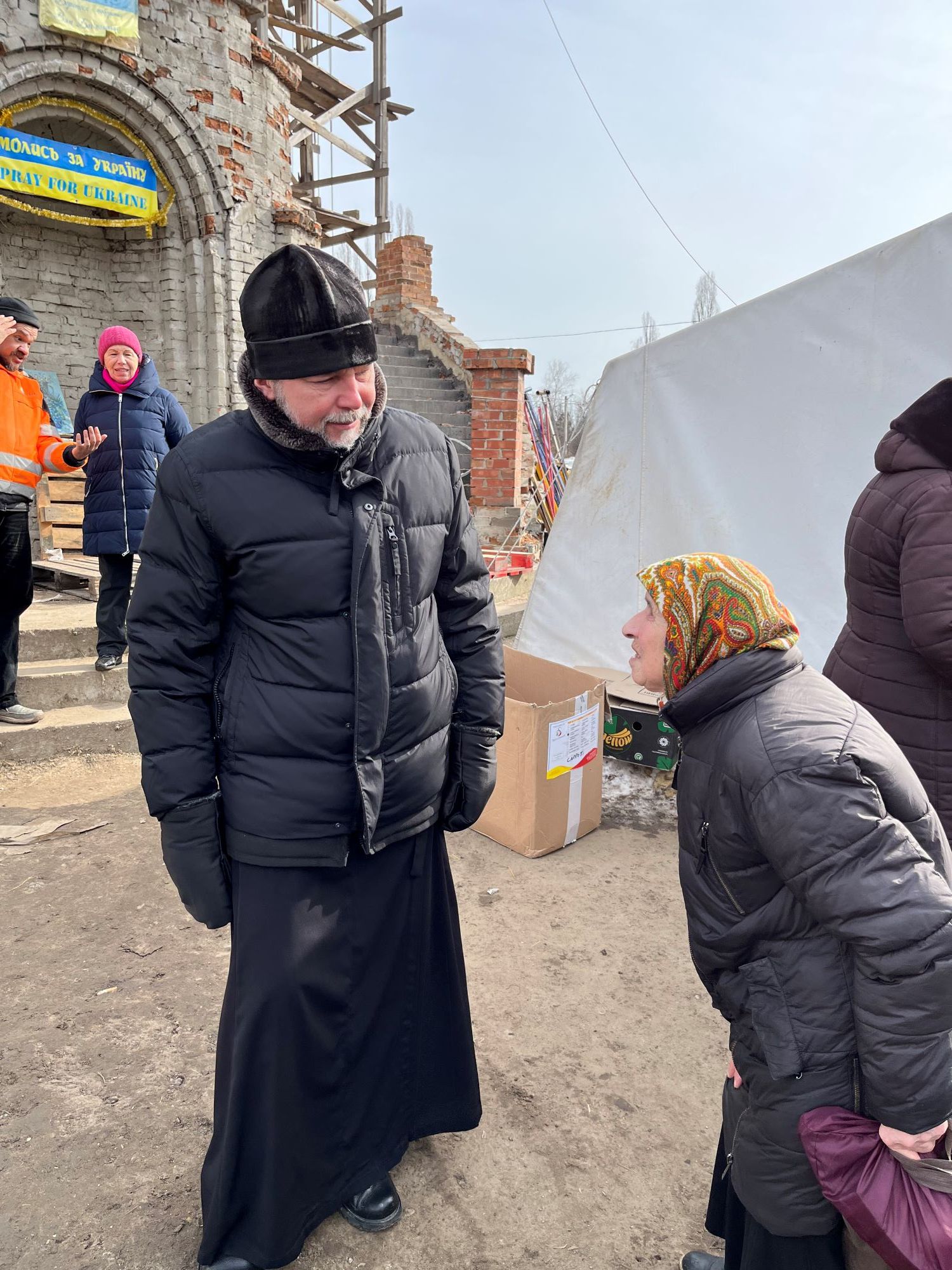
— Are there still those waiting for Russians to come among the local population?
— Everyone here is pro-Ukrainian. At least recently, I haven't heard anyone defend Russia or speak positively about it. In the frontline zones, some pointed the enemy to Ukrainian forces’ positions, and those would be hit. They give Russians the coordinates of the houses where the Ukrainian military is located. These are so-called “zhduny” ("those who wait", turncoats).
Russia was preparing for this war. It had agents in the city, saboteurs who lived here, waiting for the right moment.
— Has there been any aggression or accusations against you as a Church? Have you ever been told to leave?
— No one has ever told us such things. There is a building of ours where construction workers from the West of Ukraine work. We placed blue and yellow flags everywhere. I remember the time when the Russians were standing near Kharkiv, shelling the city. One day, an elderly lady came to us and said: “Take these flags away, or they will come and kill you."
— So she wanted to protect you.
— She did. But those little flags are still there.
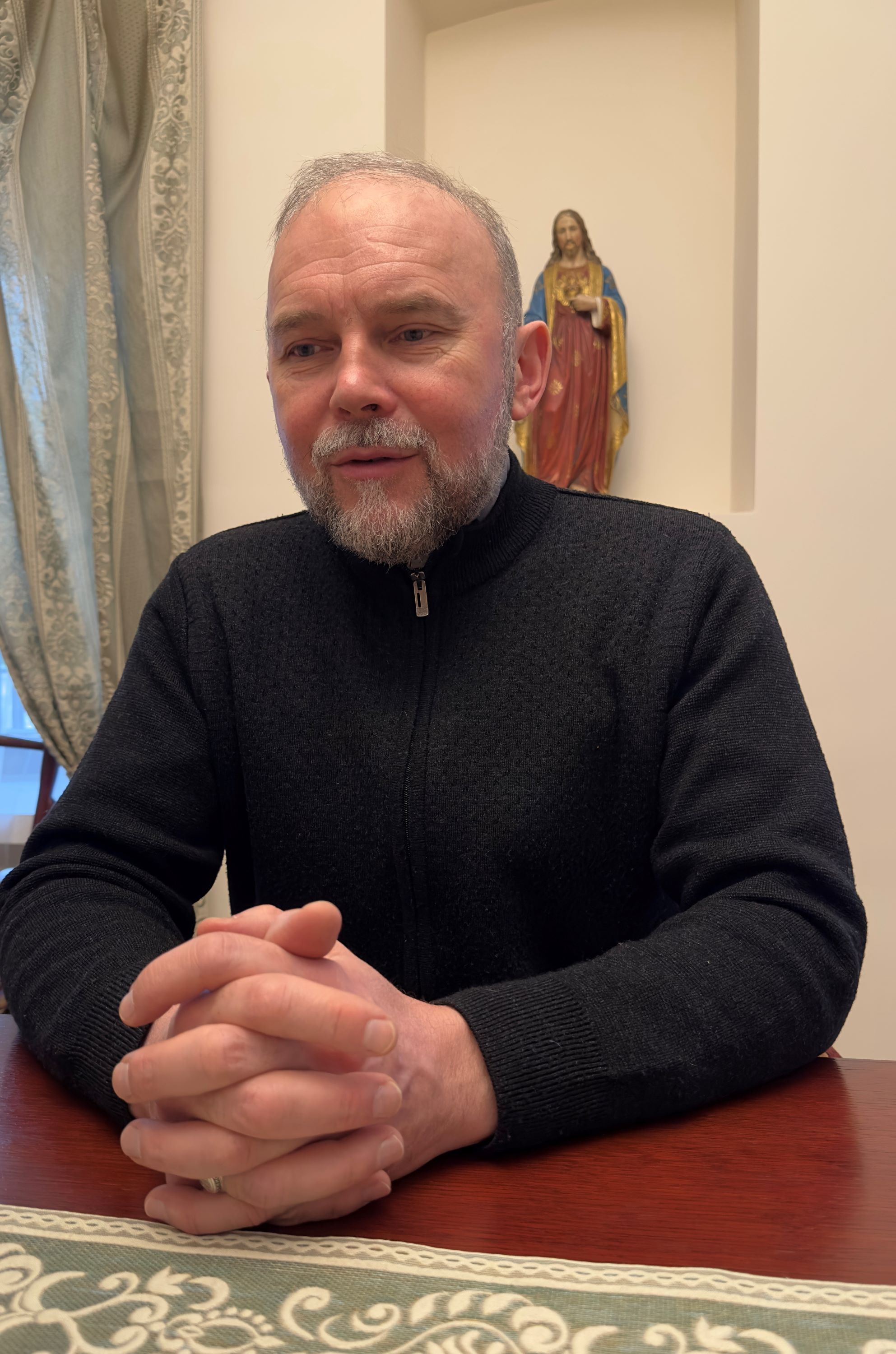
— You had to see off some of your parishioners who died at the front on their last journey. Were there many?
— Yes, we have buried many over time. The husband of one of our parishioners died in May 2022 near Bogorodychne. Another 52-year-old man was killed. Then, the son of another parishioner of ours, Ihor, was buried. He died in Kharkiv. We prayed for the deceased young woman from "Azov". She died in Mariupol from phosphorous bombs ― nothing was left of her body. Recently, a 22-year-old man, a young officer, was buried. So yes, there were many…
— Do you have military chaplains now?
— Yes. Officially, there are two military chaplains: one in the National Guard and one in the Air Defense in Kharkiv and Poltava. The service members often approach us, asking us to come and bless things. We support them in any way we can.
— The only parish of the UGCC that has yet to switch to the New Calendar is in the Kharkiv region. What is the situation in other areas of the Exarchate?
— All our people have switched to the new calendar. Only one parish adheres to the new and old calendars. People asked to keep both. We are following the New Calendar, and the parishioners have been very positive about it. Some of the people coming for help couldn’t bless the water for Epiphany on January 6, so they asked if we would give a blessing on January 19. Of course, we agreed.
Most people in Kharkiv are not church members and are not very well-versed in holidays, so they come to us with questions. Some decided to attend our church during the war. They are not opposing the new calendar.
— Are new parishes being created now?
— After the full-scale war began, we did not create new parishes, but we have so-called "mission villages" created the day before, i.e. in Izium and Lozova. We don't have churches there yet, so we conduct liturgies in ordinary rooms adjusted for service. In Izium, we use a former children's library that was later turned into a private warehouse. Now, we hold services (also according to the new calendar) and distribute aid there.
By the way, in Izium, all the churches are of the Moscow Patriarchate. There is not a single Ukrainian Church. Our parish is the only one at the moment, but we don't have a church building yet. The site meant for its construction has been mined for two years. Therefore, we can't go there and build anything, not even a chapel.
— What about the attitude of the authorities?
— We have good relations with the authorities. They are grateful to us for helping those affected by the war.
— Your Exarchate also embraces the Poltava region. Has the Church become more active there, too?
— Many people from Kharkiv went to Poltava (this city is 150 kilometres further away, giving people a greater sense of security). We also have parishioners there. Our Poltava-based parishes actively provide humanitarian aid. More people started joining them. So yes, these are developing and active parishes. We are currently building a church in Poltava and plan to build a church on the site of the burnt-out Chapel of the Holy Trinity.
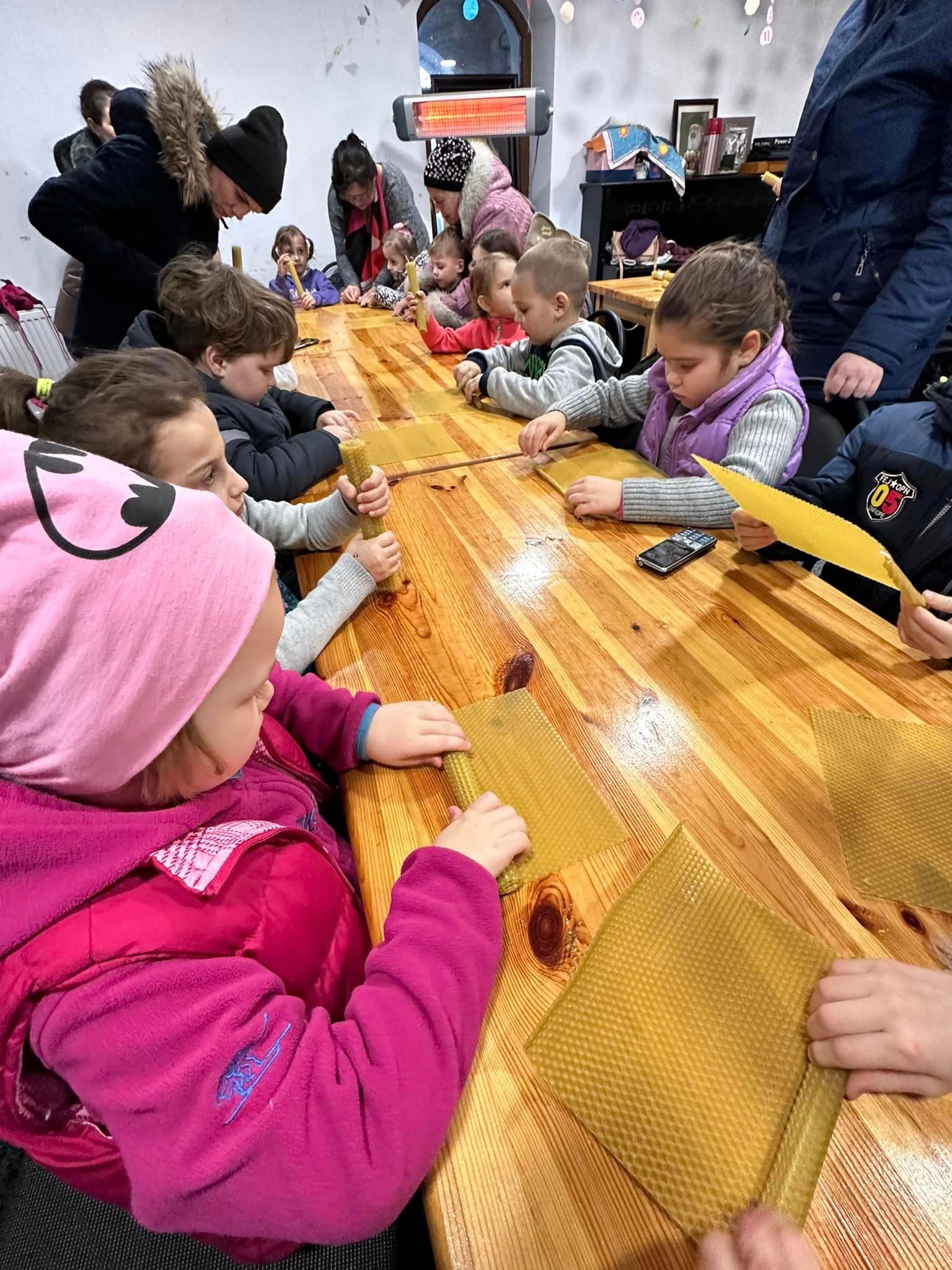
— Could you share more of your plans?
— I wish the situation were more stable. Then, it would be possible to develop the infrastructure. As it is, there is still a great danger and constant shelling. Despite everything, we do our best to serve in all parishes. Even in Vilcha on the very border. Even though a priest cannot live there, he still comes to perform divine services. The same goes for Zolochiv. One priest already lives in Izium. We try to address people’s needs and support them on a personal and spiritual level. The military service members are also reaching out to us for help.
We pray and hope the Lord will help us liberate our land so we can develop in peace, share the word of God, and develop the Ukrainian Church and culture in the East.
— What role will the Church have in Ukrainian society after the victory, particularly in Slobozhanshchyna, Naddnipryanshchyna and the Left Bank?
— Recovery will not be easy. Finding an undamaged house in the territories that have been occupied is quite a task. Here, in Stary Saltov, "Caritas" built five modular houses so people could have a place to live. They lost their homes, family heirlooms, photographs, and mementos. Nothing is left untouched. It will take decades to restore everything. Landmines contaminate vast territories.
The Church certainly will not be able to take a very active part in the physical restoration of things. However, we help to the best of our ability through “Caritas” and other charities. The humanitarian, psychological and legal assistance we provide to those affected by the war is one of the missions the Church must fulfil. That is why I believe it vital for the Church to be present, be with its people, be open to their needs and address them.
Without a doubt, the Church's primary mission is being merciful, preaching the Gospel, and sharing faith. This will help people survive the losses and sufferings the war brought to their families and heal the wounds of the soul and body.
Photos from RISU and Facebook pages: the parish of St. Nicholas the Wonderworker of the UGCC in Kharkiv









